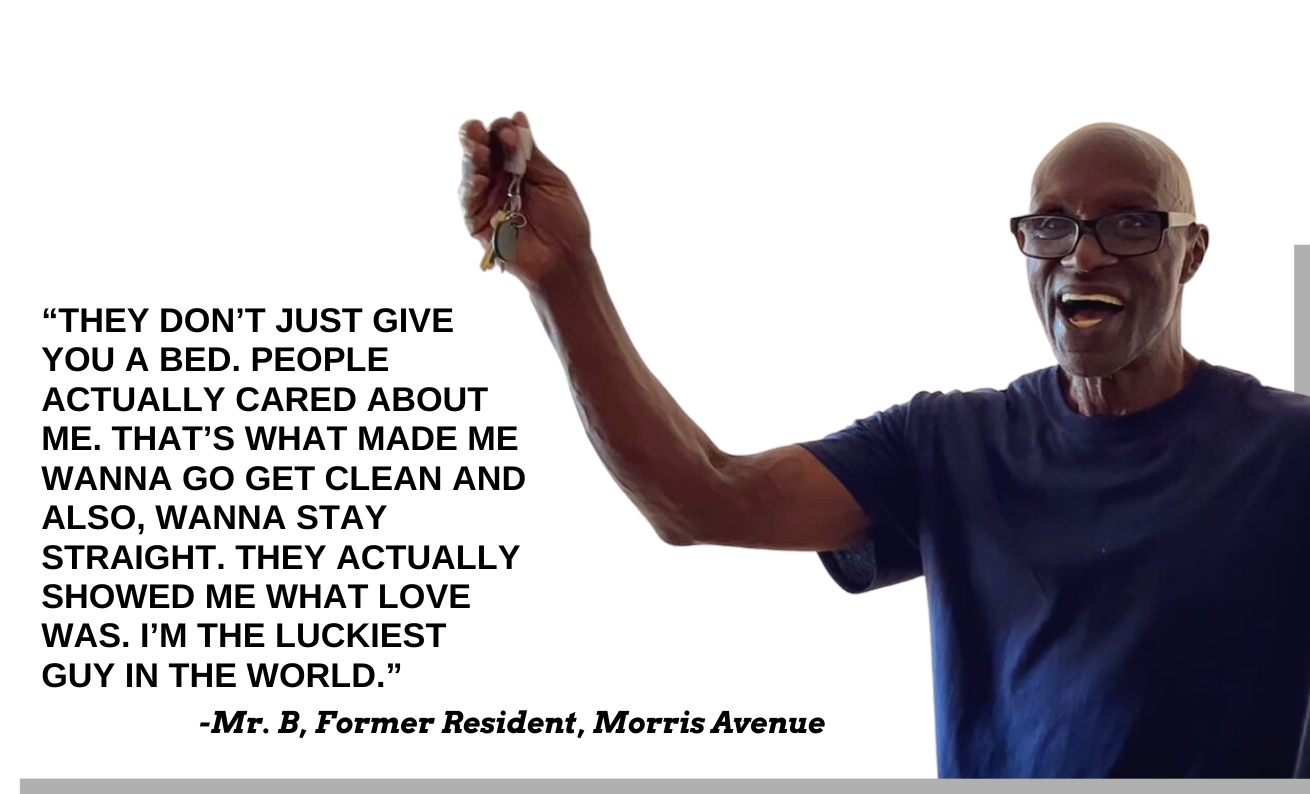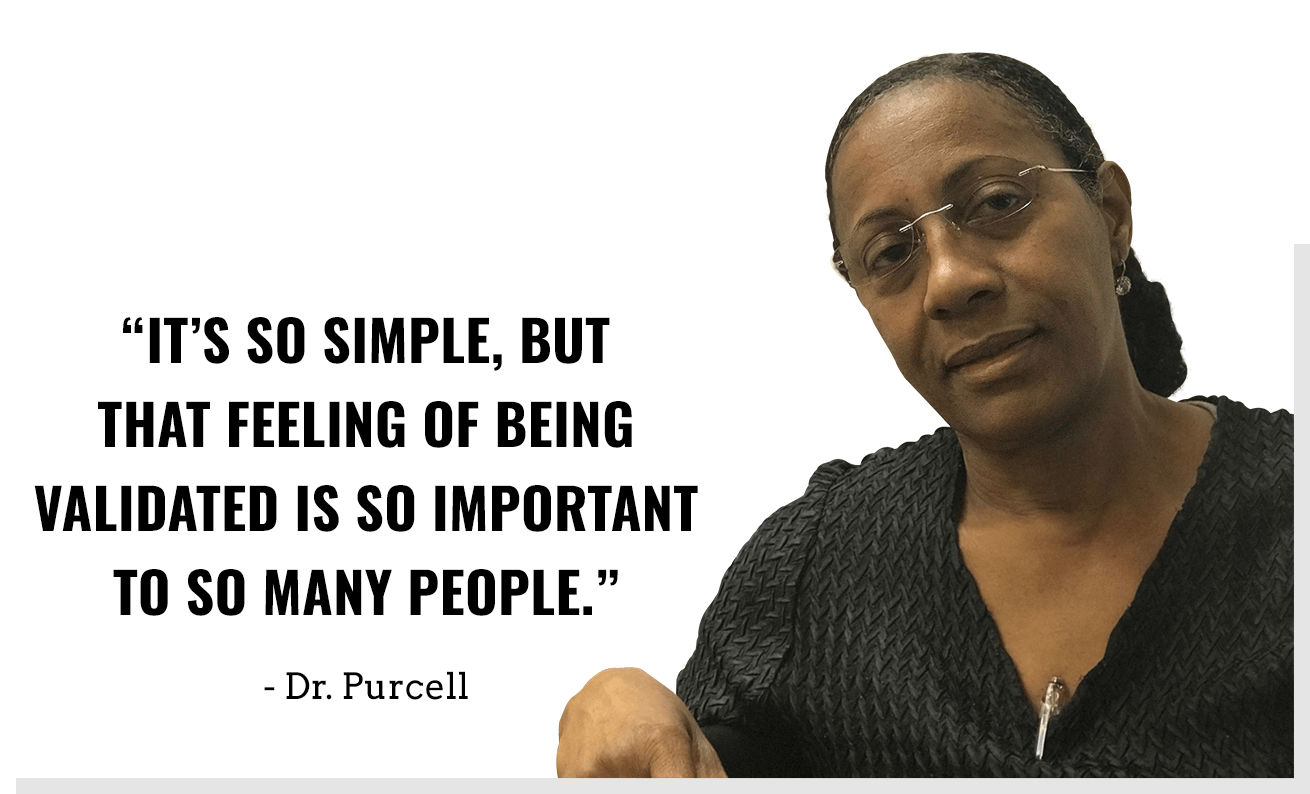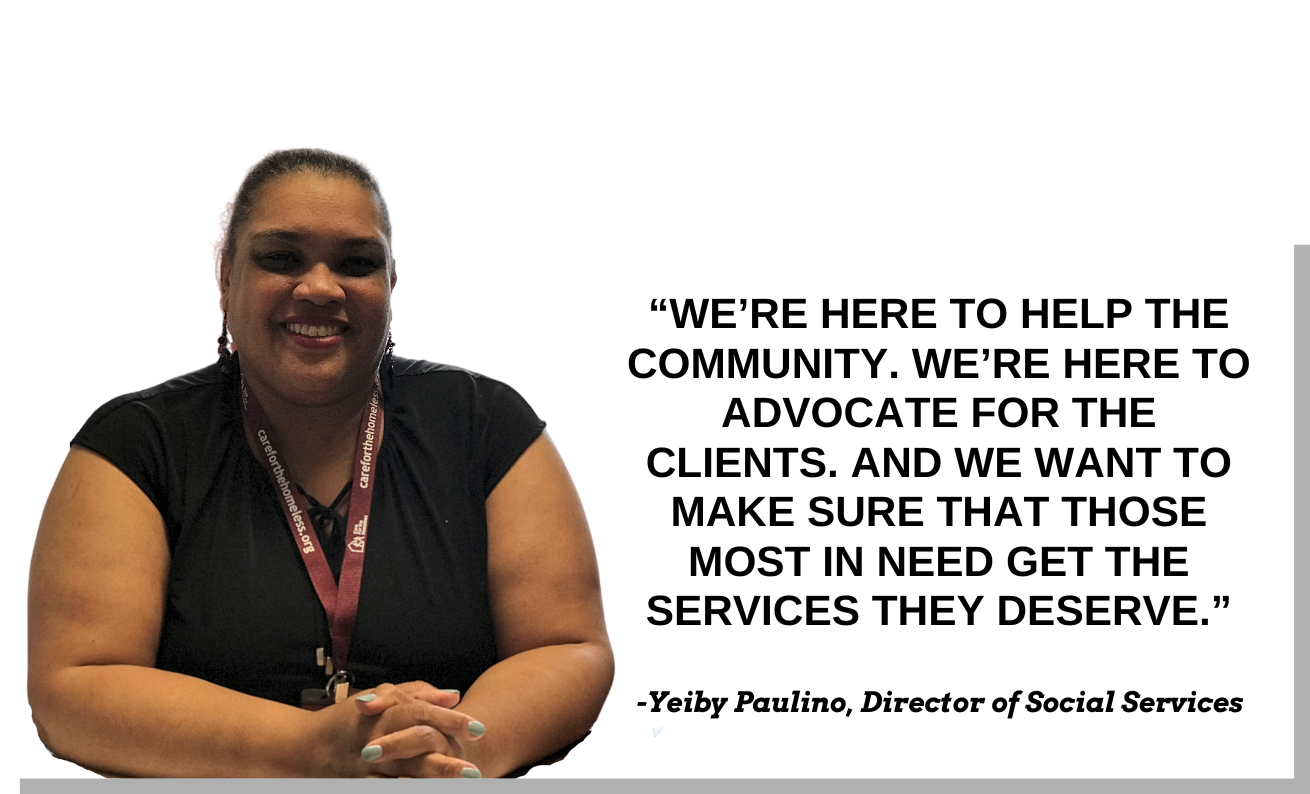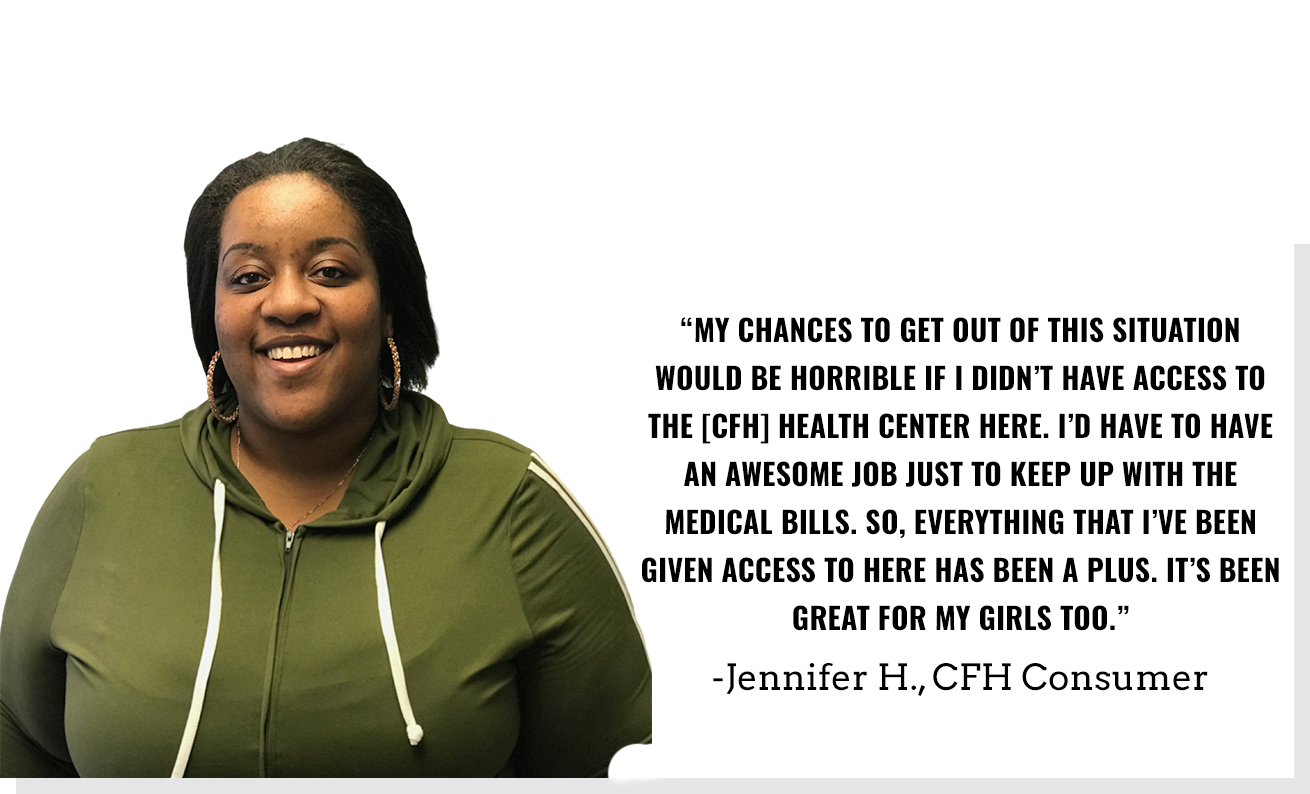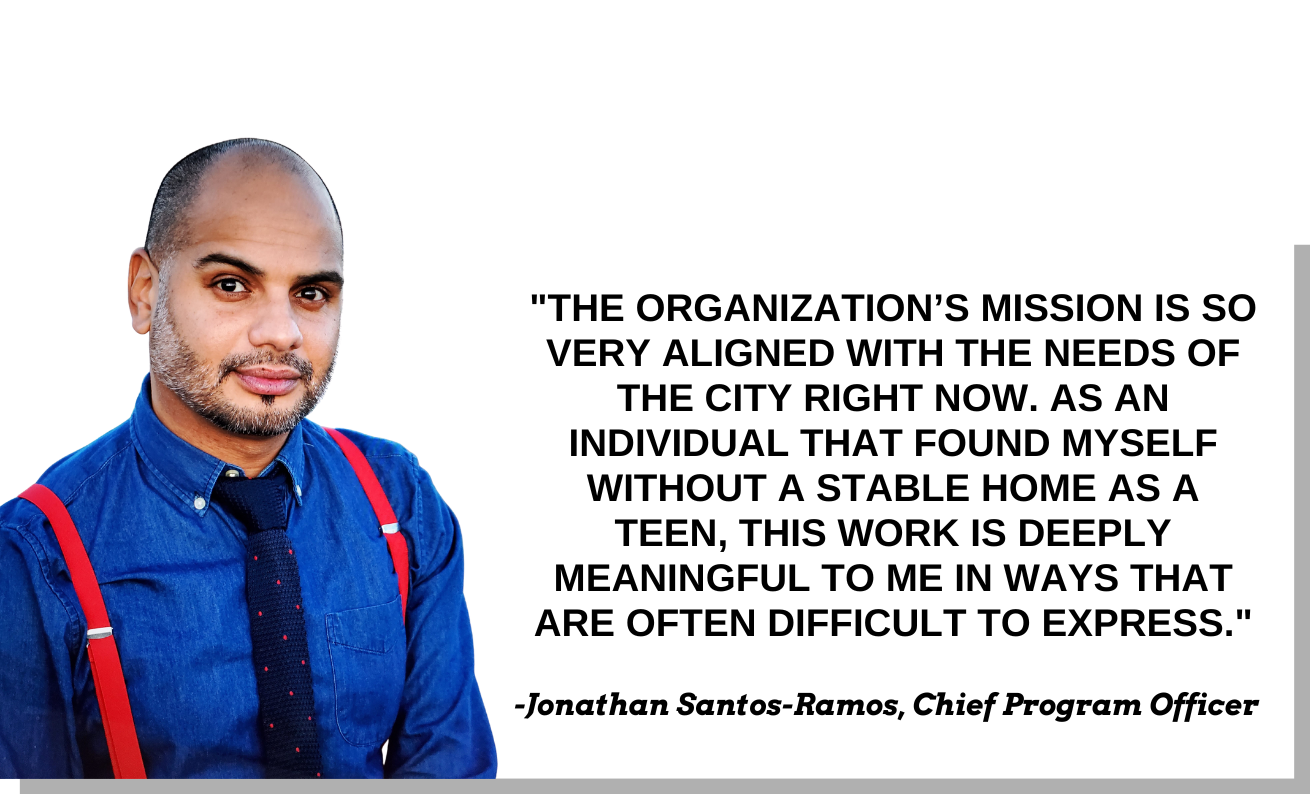“I will continue to fight for you”
In this episode of “Meet CFH,” we sat down with Will Woods, one of the newest members of our Board of Directors.
This interview has been edited for length and clarity.
How you doing? I’m Will Woods. I’m a board member of Care For the Homeless. I’ve been a board member for about the past six months, since late 2024, and I’m completely honored and happy to fulfill that role and position.
How did you decide to get involved with this work?
I am a person who has experienced homelessness on multiple levels, whether that be as a young person with regards to my family, or as a single adult. I’ve also been able to go from shelters to supportive housing, and will hopefully be able to continue my journey into independent housing.
But before my own personal experience with homelessness, I spent time since I was 17 in the corporate environment. So once I was experiencing homelessness, it was not only just as a person who was going through that experience, but it was also as a person who understood organizations and businesses and how things worked. And so I always had questions and concerns, and I was always wanting to be involved with voicing the needs and concerns of the folks that were my neighbors. But I was also sensitive to the concerns and needs and priorities for folks that were staff, and I found myself in this weird spot where I was bridging both worlds, and it kind of led me into this new world of advocacy.
Separate from that, CFH was involved with two different initiatives that I found myself to be very passionate about, that were very important to me. One was its work with the Homeless Persons’ Memorial Day, just because it really stinks to be forgotten, and that was something that a lot of my neighbors and people that I knew were at risk of. Also, the Homeless Protection Act was the first time that I saw folks actually trying to put together legislation that was going to protect the rights of folks who were experiencing homelessness, and those both resonated with me and made me want to do as much as I can to be a part of this organization.
What does being on the board entail, and what are your responsibilities?
So being on the board is a real honor for me. As I mentioned earlier, I came from a corporate background, and one of the things that was kind of—for lack of a better way of saying it—a mark of status, was being a part of these kinds of inclusive environments, where you knew that your voice, your opinions, at least had weight and mattered and were being considered.
Going through homelessness was an awkward and often trying way of achieving those goals, but being on the board allows me to be in the room again where decisions are being made, where folks are coming together that are aligned in thinking with taking care of and protecting folks experiencing homelessness. And to be in those rooms, and to be in those spaces, with folks that are thinking aligned with mine—but also, as someone who has experienced homelessness—and to make sure that we can direct our efforts and make sure that we are really targeting what we do in ways that will ultimately really be of the best efficacy and help people, is really important to me. Recently, upon joining the board, I’ve been able to apply a lot of my efforts to the Policy and Advocacy Committee, which is really important for me. I mentioned before that’s kind of where my home was and where my start was, with interacting with CFH.
I think it’s just really, really, really, really important, as leaders, as folks who want to be in the forefront of the work that we’re doing within this sector, to also be involved with making sure that we are putting laws and protections and the like in place, and we’re advocating for priorities for the folks that we are serving. And to be that voice for that community within the room is really important to me.
What would you like to do or accomplish as a board member during your tenure?
I would like to really make sure that we take away the stigmatization of homelessness. I think one of the things that we are going to continue to encounter are broader definitions for folks that we think may or may not be homeless. The way that times are changing, the way that the environment is changing, the way that different administrations govern what we do—more and more folks are being exposed to the reality that they may not have someplace to live.
So as long as we are making sure that we are championing the voices of those folks and—I’m going to throw this in here—I think one of the biggest things that’s super important and one of the things that I love about CFH is also its focus on healthcare. Most folks who are experiencing homelessness in reality can’t afford great healthcare. There are times when I—as much as I hated it at the time, wish I kind of still had my mid-level corporate healthcare, because it allowed me so many more opportunities to take care of myself.
Also, as a person who lives in the inner city, also as a person of color, our communities traditionally don’t take care of ourselves the best. We don’t have the best access to healthcare. We don’t have the best information about healthcare. So that aspect of the work that CFH provides is really, really important to me, because it’s a community that’s been chronically underserved.
Why do you think CFH’s work is important?
So, two thoughts. First, I think that it’s important to understand the full spectrum of care that folks experiencing homelessness need. It crosses so many spectrums, boundaries, and the like, whether that be physical health, whether that be mental health, whether that be emotional health, whether that be the stability of having someplace to live—all these things are important.
But I also think that CFH has done a really great job positioning itself as a leader in the sector. Whether that means, “Hey, look, this is the standard that we want to set and we’re not going to accept anything less than this for the people that we’re serving”—that’s important to me. Holding folks accountable, whether it be for contracts that are outstanding, or for services that were supposedly rendered, or promises that are made, is important to me.
Also, I think the idea of, “Hey, you know what? We’re going to listen to the folks that are receiving our services, and use their input to inform decisions you make in the future,” is important. And all of those things encompass what I think are involved in leadership. So I’m proud to be a part of an organization that is really putting their foot down, and is really intentional about setting the standard of “This is what we are. This is how we do it. We know it works and we’re not going to deviate from that. Come meet us because we are already meeting people where they are.” That’s important to me.
What further support do you think is needed for homeless New Yorkers?
I think that one of the things that has been really bad, as a person who’s been lived in New York his entire life, is how different administrations, different policies and procedures, kind of demonize, criminalize, or antagonize folks experiencing homelessness.
I think one of the things that we have come to understand is that there’s an affordable housing crisis in this city. So coming after people that are living on the edges, on the borderlines, that are just trying to make it in this great place that we call home—it’s really sad. And so, continuing efforts to avoid the marginalization, to avoid the stigmatization of homeless folks, to avoid anti-homeless architecture, to make sure that we are providing for health and needs and concerns, and we’re listening to people that are being marginalized and pushed aside—is important to me.
I also think that as we do this work, as we continue to find allies that are really supportive and aligned in our thinking, that we also make sure that we’re listening to the folks who have this lived experience, because in this particular case, we are subject matter experts. We understand this better than most folks, and what we really need, is a bunch of other folks to help us amplify what we’re feeling, to help us be able to be come up with practical solutions to the issues that we’re facing.
And also to stand alongside us when we push back and say, “Hey, listen, we’re tired of the things that are happening to us. We don’t deserve to be treated like this. We are still people. We are still constituents. We are still citizens. We are still taxpayers. You know, treat us like the members of the community that we are.
Anything else you want to add?
I’m just grateful and appreciative of the honor and opportunity to be the voice for so many of my neighbors and friends who are experiencing homelessness. I’ve had the opportunity to be in a lot of these rooms and a lot of the things that I’m saying are just echoes of conversations that I’ve had with folks that are going through this.
And I will always continue to fight for those people, and I will always continue to fight for the staff members who saw something in me and took the time and the energy to cultivate that and help, you know, help me realize and regain a lot of who and what I lost when I experienced homelessness. I appreciate all of you and I will continue to fight for you.

